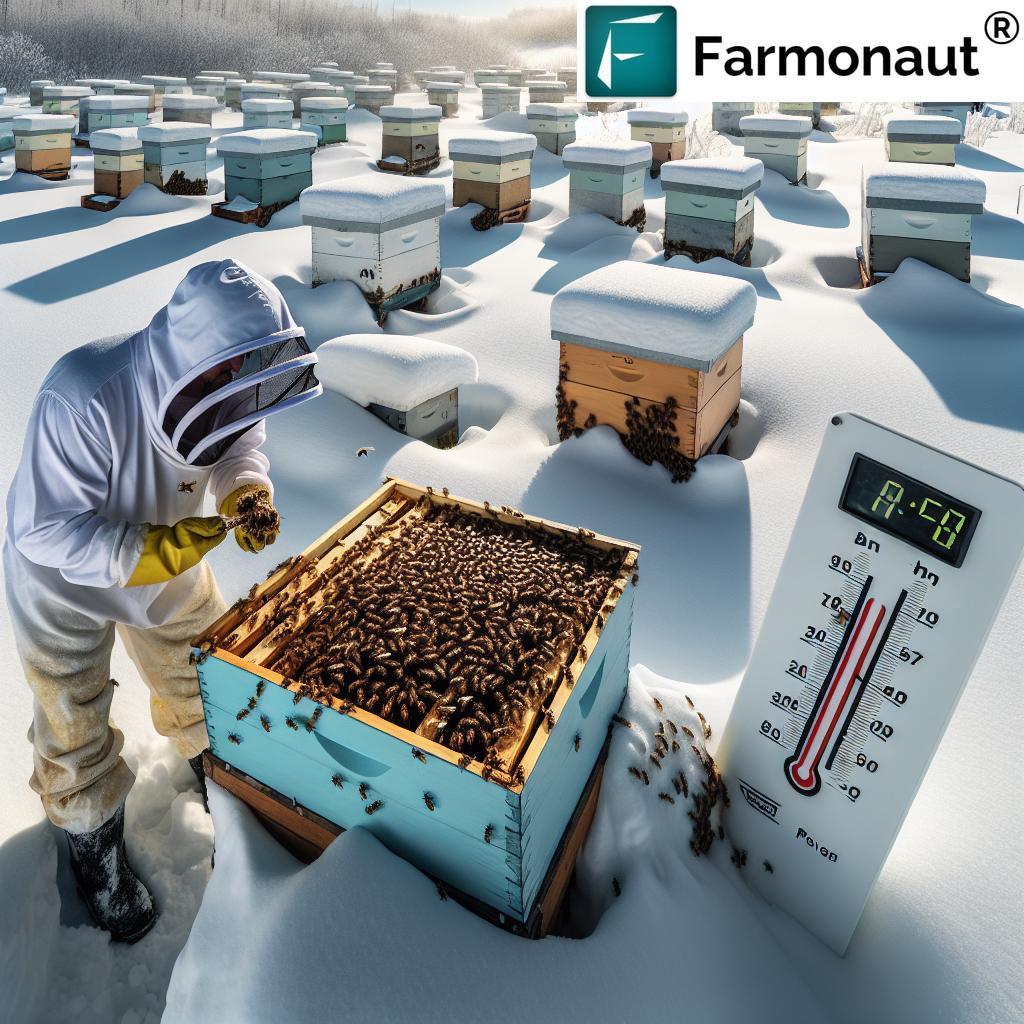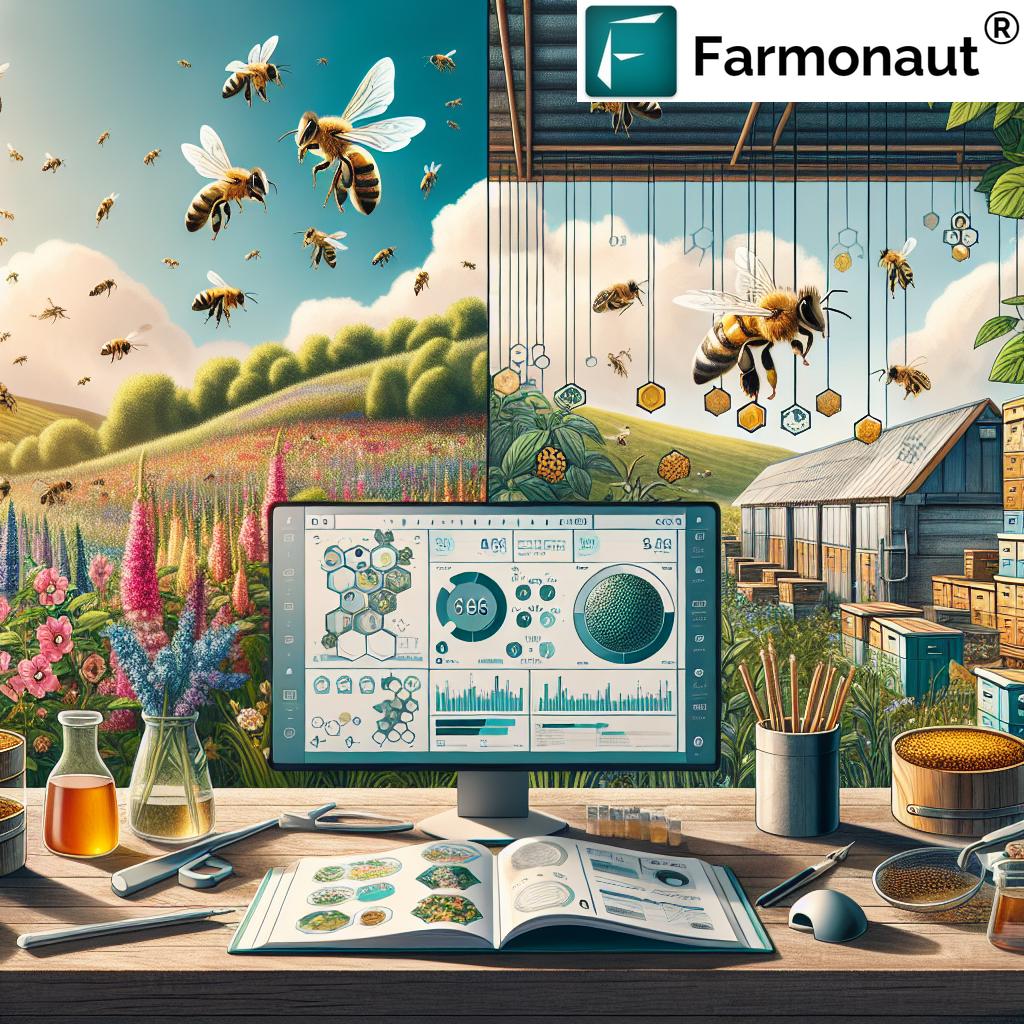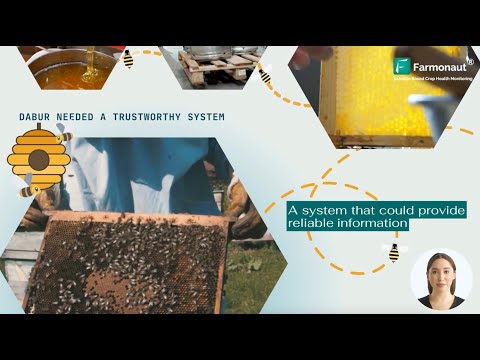Essential Guide: Winterizing Bee Hives and Biosecurity Measures for Alberta Beekeepers in 2024

“Alberta beekeepers can experience up to 30% winter colony losses without proper winterization techniques.”
Welcome, fellow beekeepers and enthusiasts! As we approach the winter of 2024, it’s crucial for us to focus on winterizing bee hives and implementing effective beekeeping biosecurity measures. In this comprehensive guide, we’ll explore essential strategies to ensure the survival and health of our bee colonies throughout the cold months in Alberta. Our goal is to equip you with the knowledge and tools necessary to navigate the challenges of modern beekeeping while embracing sustainable agriculture practices.
Understanding the Importance of Winterization
Winterizing bee hives is not just a task; it’s a critical process that can make or break the winter bee colony survival rates. In Alberta, where winters can be particularly harsh, proper preparation is the key to maintaining healthy and productive hives year-round.
- Insulation techniques to protect against extreme cold
- Ventilation management to prevent moisture buildup
- Food storage preparation to ensure adequate nutrition
- Pest control measures to safeguard colony health
By implementing these strategies, we can significantly reduce the risk of winter losses and set the stage for a thriving apiculture season come spring.
Biosecurity: A Year-Round Commitment
Beekeeping biosecurity measures are not just winter concerns but year-round necessities. These practices help protect our hives from diseases, pests, and other threats that can devastate entire colonies.
- Regular hive inspections
- Proper equipment sanitization
- Quarantine procedures for new or potentially infected hives
- Strategic placement of hives to minimize cross-contamination
By integrating these biosecurity measures into our daily routines, we create a robust defense system for our bees, ensuring their health and productivity throughout the year.
Sustainable Agriculture Practices in Beekeeping
As stewards of these incredible pollinators, it’s our responsibility to adopt sustainable agriculture practices that benefit both our bees and the environment. Let’s explore some key strategies:
- Planting diverse, bee-friendly flora
- Minimizing pesticide use in and around hives
- Implementing water conservation techniques
- Promoting natural foraging habits
These practices not only support the health of our colonies but also contribute to the broader ecosystem, enhancing biodiversity and promoting environmental sustainability.

The AgriRecovery Program: Support for Alberta Beekeepers
In recognition of the challenges faced by beekeepers, the AgriRecovery program for beekeepers has been implemented to provide crucial support. This initiative is designed to assist beekeepers who have experienced significant losses due to extreme weather conditions or other unforeseen circumstances.
“The AgriRecovery program offers financial support to beekeepers facing significant winter losses, potentially covering up to 70% of eligible costs.”
Key features of the AgriRecovery program include:
- Financial assistance for replacing lost colonies
- Support for purchasing essential equipment
- Resources for implementing enhanced biosecurity measures
- Guidance on adopting sustainable beekeeping practices
We encourage all eligible beekeepers to explore this valuable resource and take advantage of the support it offers. For more information on eligibility and application processes, please visit the official Alberta government website.
Winterization Checklist for Alberta Beekeepers
To help you prepare for the winter months, we’ve compiled a comprehensive checklist of essential tasks. This table serves as a quick reference guide for both hobbyist and commercial beekeepers in Alberta.
| Winterization Task | Timeframe | Materials Needed | Difficulty Level (1-5) | Biosecurity Impact |
|---|---|---|---|---|
| Hive Insulation | Late Fall | Insulation boards, wraps | 3 | Medium |
| Ventilation Management | Early Fall | Vents, moisture boards | 2 | High |
| Food Storage Preparation | Mid-Fall | Sugar syrup, pollen patties | 4 | Medium |
| Pest Control Measures | Year-round | Mite treatments, hive beetles traps | 5 | High |
| Weather-proofing Entrance Reducers | Late Fall | Entrance reducers, mouse guards | 1 | Low |
By following this checklist, you’ll be well-prepared to face the winter challenges and ensure the best possible outcomes for your bee colonies.
Upcoming Events and Resources
Staying informed and connected with the beekeeping community is crucial for success in our industry. Here are some upcoming events and resources to mark on your calendar:
- Alberta Beekeepers Commission Annual Conference 2024: Join us in Edmonton for a three-day event featuring expert speakers, technical sessions, and networking opportunities.
- Soil and Crop Improvement Association Webinar Series: Online workshops focusing on sustainable agriculture practices and their impact on beekeeping.
- Bee Health Management Symposium: A comprehensive event covering the latest research and techniques in maintaining healthy bee colonies.
These events offer invaluable opportunities to learn from experts, share experiences with fellow beekeepers, and stay updated on the latest industry trends and apiculture education resources.
Leveraging Technology in Beekeeping
In today’s digital age, technology plays a crucial role in enhancing beekeeping practices. Farmonaut, a leading agricultural technology company, offers innovative solutions that can benefit beekeepers in various ways:
- Satellite-based crop health monitoring for optimal forage areas
- AI-driven advisory systems for better decision-making
- Blockchain-based traceability for honey production
- Resource management tools for efficient apiary operations
By integrating these technological advancements, we can improve our beekeeping practices, enhance productivity, and contribute to more sustainable agriculture.
Explore Farmonaut’s services:
Climate Impact on Beekeeping: Preparing for the Future
The climate impact on beekeeping is becoming increasingly evident, with changing weather patterns affecting bee behavior, forage availability, and overall colony health. As responsible beekeepers, it’s crucial that we adapt our practices to these evolving conditions:
- Monitoring local climate trends and adjusting hive management accordingly
- Implementing water conservation techniques to support bees during dry spells
- Diversifying plant species in apiary surroundings to ensure year-round forage
- Staying informed about climate-related research in apiculture
By proactively addressing these climate challenges, we can create more resilient beekeeping operations that thrive in the face of environmental changes.
Enhancing Pollination Services
As beekeepers, we play a vital role in supporting agriculture through pollination services. By optimizing our hives for pollination, we not only contribute to crop productivity but also create additional revenue streams for our operations.
- Timing hive placement to coincide with crop blooming periods
- Ensuring strong, healthy colonies for maximum pollination efficiency
- Collaborating with farmers to create bee-friendly agricultural environments
- Educating the community about the importance of pollinators
By focusing on these aspects, we can enhance the value of our pollination services while promoting sustainable agricultural practices.
Managing Pesticides and Promoting Bee Health
The responsible use of pesticides is crucial for maintaining bee health and ensuring the sustainability of our beekeeping operations. Here are some key strategies for managing pesticides:
- Advocating for reduced pesticide use in agricultural areas near our apiaries
- Implementing buffer zones between treated crops and hive locations
- Educating farmers and gardeners about bee-friendly pest management techniques
- Monitoring hives regularly for signs of pesticide exposure
By taking a proactive approach to pesticide management, we can significantly reduce the risks to our bee colonies and promote overall ecosystem health.
Preparing for Spring: A Year-Round Approach
While winterization is crucial, preparing for spring is an equally important aspect of successful beekeeping. Here’s how we can ensure our colonies are ready to thrive when warmer weather returns:
- Conducting early spring hive inspections to assess colony strength
- Gradually reducing winter feeding as natural forage becomes available
- Monitoring for signs of queen failure and preparing for potential requeening
- Implementing swarm prevention techniques to maintain colony populations
By taking a year-round approach to hive management, we set ourselves up for success across all seasons.
Addressing Beekeeping Industry Challenges
The beekeeping industry faces numerous challenges, from environmental pressures to market fluctuations. Let’s explore some strategies to address these beekeeping industry challenges:
- Diversifying income streams through value-added products like beeswax and propolis
- Participating in cooperative marketing initiatives to strengthen market presence
- Investing in ongoing education and skill development
- Advocating for supportive policies at local and national levels
By tackling these challenges head-on, we can build a more resilient and sustainable beekeeping industry for future generations.
Leveraging Farmonaut’s Technology for Beekeeping
Farmonaut’s advanced agricultural technology can be particularly beneficial for beekeepers looking to optimize their operations. Here’s how our solutions can support your beekeeping endeavors:
- Use satellite imagery to identify optimal foraging areas for your bees
- Implement AI-driven advisory systems for better hive management decisions
- Utilize blockchain technology for transparent honey production traceability
- Employ resource management tools to streamline apiary operations
To explore how Farmonaut’s technology can enhance your beekeeping practices, visit our API page or check out our API Developer Docs for more detailed information.
FAQs
Q: What are the most critical steps in winterizing bee hives?
A: The most critical steps include proper insulation, ventilation management, ensuring adequate food stores, and implementing pest control measures.
Q: How can I access the AgriRecovery program for beekeepers?
A: Contact your local agricultural office or visit the official Alberta government website for information on eligibility and application procedures for the AgriRecovery program.
Q: What are some sustainable agriculture practices specific to beekeeping?
A: Sustainable practices include planting diverse, bee-friendly flora, minimizing pesticide use, implementing water conservation techniques, and promoting natural foraging habits.
Q: How can technology like Farmonaut’s solutions benefit beekeepers?
A: Farmonaut’s technology can help beekeepers identify optimal foraging areas, make better management decisions through AI advisory systems, ensure honey traceability, and streamline apiary operations.
Q: What should I do to prepare my hives for spring?
A: Conduct early spring inspections, gradually reduce winter feeding, monitor for queen health, and implement swarm prevention techniques to prepare your hives for spring.
Conclusion
As we wrap up this comprehensive guide on winterizing bee hives and implementing biosecurity measures for Alberta beekeepers in 2024, we hope you feel equipped with the knowledge and strategies necessary to ensure the health and productivity of your bee colonies. Remember, successful beekeeping is a year-round commitment that requires adaptability, continuous learning, and a dedication to sustainable practices.
By implementing the techniques discussed, staying informed about industry developments, and leveraging innovative technologies like those offered by Farmonaut, we can navigate the challenges of modern beekeeping while contributing to a more sustainable agricultural future. Let’s work together to protect our bees, enhance our operations, and continue the vital work of pollination that supports our ecosystems and food supply.
Here’s to a successful beekeeping season and thriving, healthy colonies throughout the year!




















